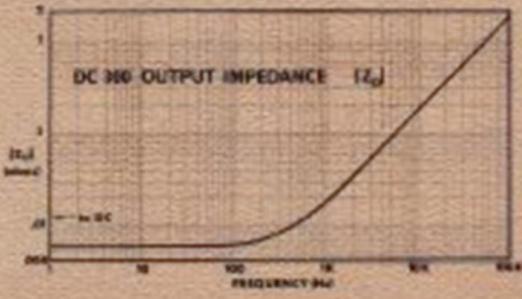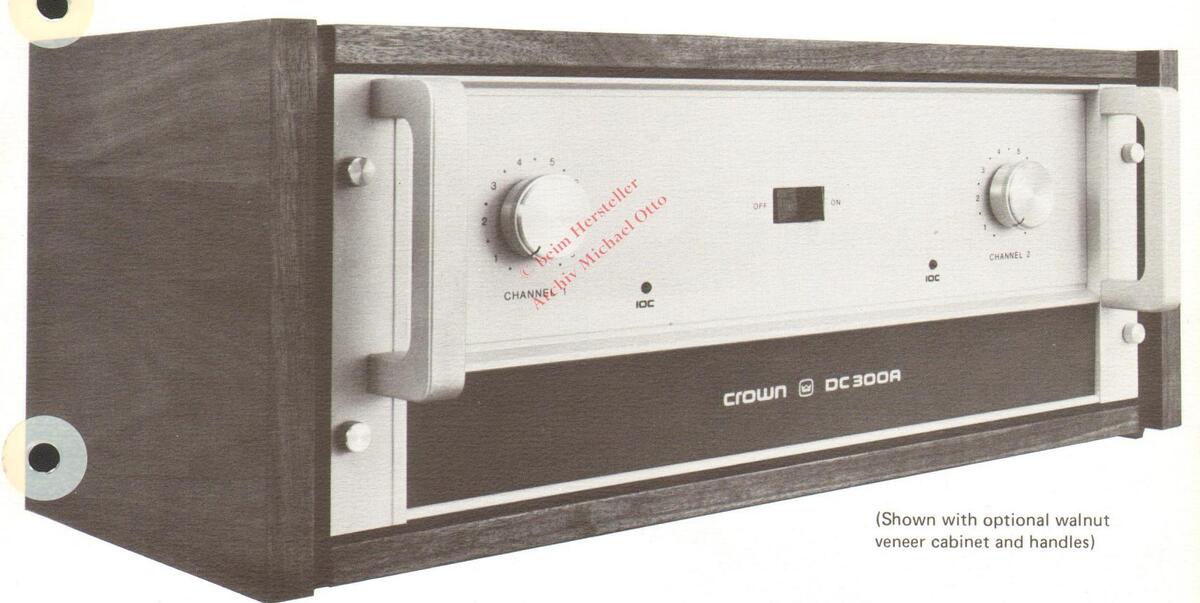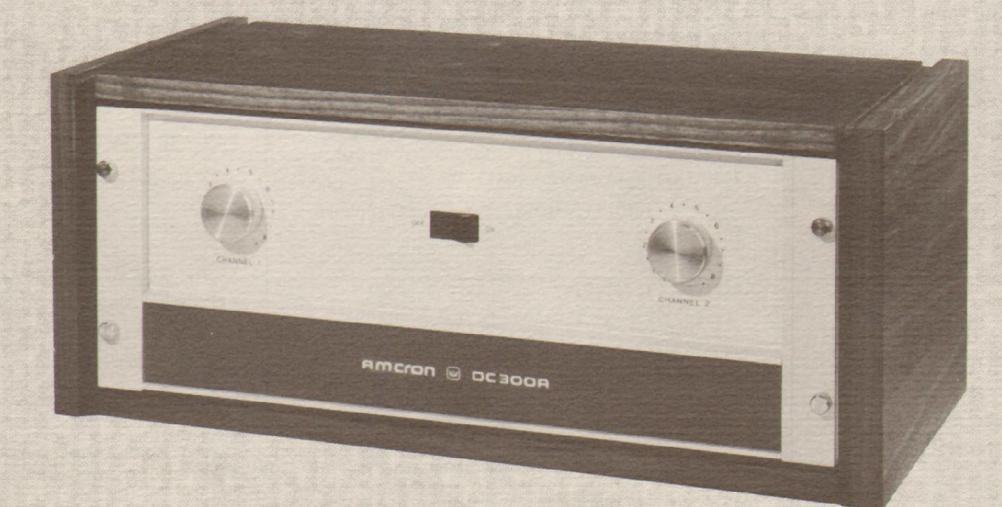
DC 300
C
DUAL-CHANNEL BASIC AMPLIFIER
Leadership
HIGH FIDELITY:
SOUND REINFORCEMENT:
STUDIO MONITOR
ACOUSTICS LABORATORY:
LAB STANDARD
The goals achieved in the DC-300 are those of a Laboratory Standard-heretofore unattainable in a power amplifier of modest price. New perfection is realized in the areas of distortion, noise, stability, self-protection, power output and economy. It is possible to obtain a monaural 70.7 v balanced output without a transformer.
Unlike ordinary AC-coupled amplifiers, the DC-300 exhibits a near perfect "transfer function" completely linear gain-bandwidth, excellent phase response and instantaneous overload recovery (even on non-symmetrical waveforms). The behavior of any load is not influenced by the negligible internal impedance.
A total of 38 discrete transistors, 2 differential (dual) transistors, 28 diodes and 6 zener diodes are utilized in the unique direct-coupled circuitry (patent pending). Self-protection is threefold-VI limiting, thermal breakers, and overall fusing of the 60-amp-rated output devices. A massive 1 KW power supply drives the amp, and features quad-regulation of input stages.
When reproducing complex waveforms as in music, the total clarity and astonishing ease of the DC-300 is immediately apparent—even with "medium" transducers. Steady-state power output is prodigious—independent of waveform, with solid, linear response to DC. This amplifier most nearly approaches the Ideal—a "Straight Wire with Gain,"
A few Reports from the Field:
C, B, of Pennsylvania (Dealer and Recording Studio) IT'S FABULOUS!
M. R. of California (Customer) QUITE POSSIBLY THE BEST AMPLIFIER TO DATE.
R, G. of California (Audio Engineer) THIS AMPLIFIER INCORPORATES THE CIR-CUITRY OF THE FUTURE, THIS IS THE PRODUCT WE'VE BEEN LOOKING FOR.
R, F. of Minnesota (Engineer and Rep) INCOMPARABLE! MEETS OR EXCEEDS ALL SPECS-THE FINEST AMP I HAVE EVER MEASURED!
PERFORMANCE SPECIFICATIONS
GRAPHS



TYPICAL PHASE RESPONSE



MADE ONLY IN AMERICA
BOX 1000 ELKHART INDIANA PHONE: (219) 523-4919 126 *9-68
Skilled American craftimen fabricate, atsemble, and individually adjust each
ICC IHE DIFFERENT DISTORTION INDICATOR
WHAT: IOC (Input-Output Comparator) acts in conjunction with existing amplifier circuitry to monitor musical waveforms. The system analyzes the amplifier's input and output waveforms noting the difference.

WHY:
: CROWN's IOC system brings you these benefits:
- 1.) Accuracy: Whenever rated distortion levels in the amplifier are approached, the user is notified under actual listening conditions. When IOC is off, the listener is assured that he is avoiding excessive distortion levels, and that the input signal is virtually identical to its output.
- 2.) Sensitivity: Short durations of distortion levels triggering IOC are held to allow you time to monitor them.
- 3.) Compatibility: IOC allows you, without elaborate test equipment, to determine the proper size amplifier for your listening needs whatever they may be.
WHO: CROWN DC-300A and D-150A amplifiers now incorporate a unique music distortion indication system called IOC.
- 4.) Retrofitability: Because of the extremely useful information that IOC provides and in keeping with CROWN's policy of avoiding continual model changes and planned obsolescence existing owners of DC-300A's and D-150A's may have their units updated for $70.00. Units must be returned to the factory as the cost includes laboratory check-out after IOC is installed.
- HOW: Inherent in the design of CROWN amplifiers is the presence of a correction signal anytime the feed-back loop indicates a difference between the input and output of the amplifier. The input IC acts as an input and output comparator on a continuing basis. When any kind of nonlinear behaviour appears, the IC generates a correction signal in order to match the output to the input again. The CROWN IOC network monitors this correction signal and lights the indicator LED when a correction signal indicating any kind of nonlinearity is present.
The advantage over the traditional clip indicator becomes apparent when the action of such a circuit is considered. Sensitive only to output voltage, the more common LED clip indicator can not respond to protection circuit activation (caused by either signal or load problems) or slew induced distortion (commonly called Transient Intermodulation Distortion or TIM), and may not even report amplifier clipping if it is brief.

The IOC , by contrast reports any and all forms of amplifier non-linear behaviour, including SID, protection circuit activation, and all amplifier clipping no matter how brief. The circuit sensitivity is extremely high, as the front panel display is activated before amplifier distortion specifications (.05% THD, IMD) are reached.
WHERE: IOC is available only from your CROWN dealer. See him today!

1718 W. MISHAWAKA ROAD, ELKHART, INDIANA 46514, (219) 294-5571, TWX 810-294-2160

AWCION
DC-300A
The AMCRON DC-300A is a single or dual channel power amplifier designed for precision amplification of frequencies from 1Hz to 20kHz. The design of the DC-300A provides extremely low harmonic and intermodulation distortion with very low noise. A switch on the rear of the unit allows stereo or mono operation with no internal wiring changes. In the mono mode, the DC-300A is capable of a 70V balanced line output. The unit operates on AC current from 120V to 256V. See complete specifications on reverse side.
The DC-300A contains output protection circuitry pioneered by AMCRON. This circuitry protects the unit completely against shorted, mismatched, or open loads and completely eliminates the need for DC fuses and mode switches to protect the amplifier. With this unique protection system, the DC-300A can safely drive any speaker load, resistive or reactive, with no fear of harming the amplifier. The speakers can be paralleled with no deterioration of sound quality since changing the bad impedance only affects the maximum power available, not the ability of the amplifier to produce clean sound.
The DC-300A has two totally separate direct coupled amplifier circuits employing dual integrated circuit op amp input stages and shicon transistors in succeeding stages. The DC-300A exhibits essentially flat frequency and phase response down to DC and eliminates thumping from non-symmetrical wave forms. Output stages utilize AMCRON class AB + B circuitry in which the driver transistors carry the quiescent bias current while the output transistors serve only as boosters which sense and deliver large currents.
*The DC-300A may be rack mounted, or as shown, an optional cabinet is available.

DC-300A Specifications
Output Power
155 watts per channel minimum RMS (both channels operating) into an 8 ohm load over a bandwidth of 1Hz-20 KHz at a rated RMS sum total harmonic distortion of 0.05% of the fundamental output voltage.
Frequency Response
±0.1 dB DC-20KHz at 1 watt into 8 ohms ± 1dB DC-100KHz at 1 watt into 8 ohms.
1KHz Power
180 watts RMS into 8 ohms, per channel. both channels operating, 0.1% total
Harmonic Distortion
Less than 0.001% from 20 Hz-400 Hz and increasing linearly to 0.05% at 20 KHz at 155 watts RMS per channel into 8 ohms.
IM Distortion (60 Hz-7KHz 4:1)
Less than 0.05% from 0.01 watts to 0.25 to 155 watts into 8 ohms per channel.
Slewing Rate
8 volts per micro-second (slewing rate is the maximum value of the first derivative of the output signal, or the maximum slope of the
Damping Factor
Greater than 750, DC-400 Hz into 8 ohms
Less than 7 milliohms in series with less than 3 microhenries.
Rated for 8 ohm usage; safely drives any load including completely reactive loads.
Voltage Gain 20.6 ± 2% or 26.3 ± 0.2 dB at maximum gain.
Input Sensitivity 1.71 volts + 2% for 155 watts into 8 ohms.
Output Signal Unbalanced, dual channel.
MONAURAI Output Power
310 watts minimum RMS into a 16 ohm load over a bandwidth of 1Hz-20KHz at a rated RMS sum total harmonic distortion of 0.05% of the fundamental output voltage.
Frequency Response
±0.15 dB DC-20 KHz at 1 watt into 16 ohms; ± 1 dB DC-60KHz at 1 watt into 16
360 watts RMS into 16 ohms.0.1% total
Harmonic Distortion
Less than 0.001% from 20 Hz - 400Hz and increasing linearly to 0.05% at 20 KHz
I.M. Distortion
Less than 0.05% from 0.01 watts to 0.25 watts and less than 0.01% from 0.25 watts to 310 watts into 16 ohms
Slewing Rate
16 volts per microsecond
Damping Factor
Greater than 700, DC-400 Hz into 16 ohms.
Less than 15 milliohms in series with less
Load Impedance
Rated for 16 ohm usage; safely drives any load including completely reactive loads.
Voltage Gain gain.
Input Sensitivity
1.71 volts for 310 watts into 16 ohns
Output Signal
Balanced, single channel
GENERAL
Phase Response
Input Impedance
25 K ohms. + 30%
Short, mismatch, and open circuit proof. pulses, thumps, cutout, etc. No premature
AC line fused, thermal switch in AC line protects against overheating caused by inrate voltage amplifiers protect overall amplifier against RF burnouts. Input overresistance at inputs of amp.
DC Output Offset
(Shorted input) 10 millivolts or less, internally adjustable to zero.
Wideband multiple feedback loop design utilizing one linear 1C (dual op-amp) Total equivalent of 59 transistors. 32 signal diodes, 3 zeners and 6 rectifier diodes.
Power Supply
1 kilowatt transformer with massive computer-grade filter capacitors storing over 48 joules of energy. Two regulated supplies for complete isolation and stability.
Power Requirements
Requires 50 - 400 Hz AC with adjustable taps for 120, 128, 240, 248 and 256 v. ± 10% operation. Draws 40 watts or less on idle, 510 watts at 310 watts total output
Heat Sinking
The entire amplifier is used as a heat sink. Front panel extrusion acts as a heat sink
heat conduction and minimum weight.
Independent input level controls are on front panel. Power switch, with integral front panel. Stereo-mono switch on rear
Input - 1/4 inch phone jack Output - Color coded binding posts AC Line - three-wire (grounded) male connector on 5 ft, min, cable.
19 inch standard rack mount (w.e. hole spacing) 7 inches high, 9-3/4 inches deep
Weight (Net)
Satinized aluminum front panel with charcoal gray suede textured lower panel

1718 West Mishawaka Road Elkhart, Indiana 46514 U.S.A 219-294-5571 TWX 810-294-2160



CC-300A
The CROWN DC-300A is a single or dual channel power amplifier designed for precision amplification of frequencies from 1Hz to 20kHz. The design of the DC-300A provides extremely low harmonic and intermodulation distortion with very low noise. A switch on the rear of the unit allows stereo or mono operation with no internal wiring changes. In the mono mode, the DC-300A is capable of a 70V balanced line output. The unit operates on AC current from 120V to 256V. See complete specifications on reverse side.
The DC-300A embodies the simplest and yet most accurate distortion display available in any audio product. The IOC-Input-Output Comparator-senses any form of amplifier non-linear behavior and reports its existence through front panel LED's. Slew-induced distortion, protection circuit activation, and clipping distortion will all be detected by the IOC circuit at levels below the rated distortion of the amplifier. Thus, the amplifier becomes a valuable tool in the hands of the user to facilitate proper amplifier-speaker-environment matching, as well as a continuous monitor of the purity of the signal reproduction through the amplifier under actual operating conditions.
The DC-300A contains output protection circuitry pioneered by CROWN. This circuitry protects the unit completely against shorted, mismatched, or open loads and completely eliminates the need for DC fuses and mode switches to protect the amplifier. With this unique protection system, the DC-300A can safely drive any speaker load, resistive or reactive, with no fear of harming the amplifier. The speakers can be paralleled with no deterioration of sound quality since changing the load impedance only affects the maximum power available, not the ability of the amplifier to produce clean sound.
The DC-300A has two totally separate direct coupled amplifier circuits employing dual integrated circuit op amp input stages and silicon transistors in succeeding stages. The DC-300A exhibits essentially flat frequency and phase response down to DC and eliminates thumping from nonsymmetrical wave forms. Output stages utilize CROWN class AB + B circuitry in which the driver transistors carry the quiescent bias current while the output transistors serve only as boosters which sense and deliver large currents.
As with other CROWN components, the DC-300A is completely protected by a full warranty for three years against defects in parts and workmanship. CROWN pays parts, labor, and round trip shipping, should the DC-300A need service.
*The DC-300A may be rack mounted, or as shown, an optional cabinet is available.

STEREO
Output Power
155 watts per channel minimum RMS (both channels operating) into an 8 ohm load over a bandwidth of 1Hz-20KHz at a rated RMS sum total harmonic distortion of 0.05% of the fundamental output voltage.
250 watts per channel minimum RMS (both channels operating) into a 4 ohm load over a bandwidth of 1Hz-20KHz at a rated RMS sum total harmonic distortion of 0.05% of the fundamental output voltage
Frequency Response
+0.1 dB DC-20KHz at 1 watt into 8 ohms: + 1 dB DC-100KHz at 1 watt into 8 ohms
1KHz Power
180 watts BMS into 8 ohms per channel both channels operating, 0.1% total harmonic
Harmonic Distortion
Less than 0.001% from 20Hz-400Hz, and increasing linearly to 0.05% at 20KHz at 155 watts RMS per channel into 8 ohms.
IM Distortion (60Hz-7KHz 4:1)
Less than 0.05% from 0.01 watts to 0.25 watts and less than 0.01% from 0.25 watts to 155 watts into 8 ohms per channel.
Noise Transfer Intermodulation Distortion (NITIM)
Less than 0.0035% at 155 w/ch peak equivalent level. Test signal 10KHz white noise (crest factor 3.9); distortion products measured below 10KHz; NTIM testing is highly sensitive to audible products of high frequen-
Slewing Rate
8 volts per micro-second (slewing rate is the output signal, or the maximum slope of the output signal).
Damping Factor
Greater than 750, DC-400Hz into 8 ohms.
Output Impedance
Less than 7 milliohms in series with less than 3 microhenries.
Load Impedance
Rated for 8 ohm and 4 ohm usage; safely drives any load including completely reactive
20.6±2% or 26.3 dB±.2 dB at maximum gain. Input Sensitivity
1.71 volts ± 2% for 155 watts into 8 ohms.
Output Signal
Unbalanced, dual channel.
MONAURAL
Output Power
310 watts minimum RMS into a 16 ohm load over a bandwidth of 1Hz-20KHz at a rated RMS sum total harmonic distortion of 0.05% of the fundamental output voltage.
500 watts minimum BMS into a 8 ohm load over a bandwidth of 1Hz-20KHz at a rated RMS sum total harmonic distortion of 0.05% of the fundamental output voltage.
Frequency Response
±0.15 dB DC-20KHz at 1 watt into 16 ohms; ±1 dB DC-60KHz at 1 watt into 16 ohms.
1KHz Power
360 watts RMS into 16 ohms, 0.1% total harmonic distortion.
Harmonic Distortion
Less than 0.001% from 20Hz 400Hz and increasing linearly to 0.05% at 20KHz at 310 watts into 16 ohms.
I.M. Distortion
Less than 0.05% from 0.07 watts to 0.25 watts and less than 0.0 % from 0.25 watts to 310 watts into 16 ohms.
Noise Transfer Intermodulation Distortion (NTIM)
Less than 0.0035% at 155 w/ch peak equivalent level. Test signal 10KHz white noise (crest factor 3.9); distortion products measured below 10KHz; NTIM testing is highly sensitive to audible products of high frequen-
Slewing Bate
16 volts per micro-second (slewing rate is the maximum value of the first derivative of the output signal, or the maximum slope of the output signal).
Damping Factor
Greater than 700, DC-400Hz into 16 ohms.
Output Impedance
Less than 15 milliohms in series with less than
Rated for 16 ohm and 8 ohm usage: safely drives any load including completely reactive
Voltage Gain
41.2 ±2% or 32.3 dB±0.2 dB at maximum gain. Input Sensitivity
1.71 volts for 310 watts into 16 ohms. Output Signal
Balanced, single channel.
GENERAL
(20Hz-20KHz) 115 dB below rated output.
Phase Response + 0, -15o zero to 20KHz at 1 watt.
Input Impedance
25K ohms, ± 30%.
Overall Protection
AC line fused, thermal switch in AC line protects against overheating caused by in-
voltage amplifiers protect overall amplifier against RF burnouts. Input overload protection is furnished by internal resistance at
DC Output Offset
(Shorted input) 10 millivolts or less, internally adjustable to zero.
Turn-on
Instantaneous, with minimum thumps, and no
Power Supply and Requirements
1 kilowatt transformer with massive computer-grade filter capacitors storing over 48 joules of energy. Two regulated supplies for complete isolation and stability. Requires 50-400Hz AC with adjustable taps for 120, 128, 240, 248 and 256v, ± 10% operation. Draws 40 watts or less on idle 510 watts at
Controls
Independent input level controls are on front panel. Power switch, with integral pilot light is on front panel. Non-interacting DC balance controls are mounted behind front panel.
Connectors
Output - Color coded binding posts AC Line - three-wire (grounded) male connector on 5 ft, min, cable
Dimensions and Weight
19 inch standard rack mount (w.e. hole spacing) 7 inches high, 9-3/4 inches deep (from mounting surface); 48 pounds.

1718 West Mishawaka Road Elkhart, Indiana 46514 219-294-5571 TWX 810-294-2160



Kraftverstärker für ein- oder zweikanaligen Betrieb DC-300A
Der AMCRON DC-300 A ist ein Kraftverstärker, der für eine präzise Verstärkung von Frequenzen von 1 Hz bis 20 kHz ausgelegt ist, und der sowohl für 1-Kanal – als auch für 2-Kanal-Verstärkung eingesetzt werden kann. Der technische Aufbau des OC-300 A ist an der Zielvorstellung einer extrem niedrigen harmonischen – und Intermodulationsverzerrung bei verschwindend geringen Nebengeräuschen orientiert. Durch eine einfache Umverdrahtung wird der DC-300 A auf monoaurale Verstärkung umgestellt, wobei linear und unverzerrt 70 Volt am Ausgang gemessen werden. Das Gerät arbeitet an einer Wechselspannung von 120–256 Volt. Ausführliche Daten sind auf der Rückseite angegeben.
Die Ausgänge des DC-300 A sind mit einer eigens von AMCRON entwickelten Schutzschaltung ausgerüstet. Diese Sicherheitslogik schützt die Anlage bei Überschreitung der vorgegebenen Ausgangsleistung. Damit wurden Gleichstromsicherungen und Bedienungsknöpfe unnötig. Mit dieser einzigartigen Sicherheitslogik kann jeder Lautsprecher – ob bei resistiver oder reaktiver Belastung – rlsikolos angeschlossen werden. Dabei nimmt der Verstärker, auch bei Bedienungsfehlern, garantiert keinen Schaden. Ohne Beeinträchtigung der Klangqualität können Lautsprecher parallel geschaltet werden, beeinflußt eine Änderung der Belastungsimpedanz doch lediglich die zu Verfügung stehende maximale Ausgangsleistung, nicht aber die Funktion, Frequenzen unverfälscht zu verstärken.
Der DC-300 A ist mit zwei, völlig voneinander unabhängigen direkt gekoppelten Verstärkerschaltungen ausgerüstet und verwendet als Eingangsstufen doppelt integrierte Operationsverstärkerschaltungen. In den nachfolgenden Stufen finden Silicon-Transistoren Verwendung. Ab 0 Hz zeichnet sich der DC-300 A durch einen extrem ebenmäßigen Frequenzverlauf und äußerst lineares Phasenverhalten aus. Durch asymmetrische Wellenformen erzeugte Störungen werden eliminiert. Die Ausgangsstufen sind nach dem AMCRON "AB + B" Prinzip geschaltet, wobei in den Driver-Transistoren Ruhestrom fließt während die Ausgangstransistoren als Stromverstärker fungieren und somit die hohe Ausgangsleistung produzieren.
Nach der Fertigung wird jeder einzelne Verstärker einem sorgfältig ausgearbeiteten Testverfahren unterzogen. Erreicht ein Verstärker nicht die von uns garantierten Messdaten, wird er nicht zum Versand freigegeben. Die tatsächlich erzielten Messdaten werden auf einer Urkunde vermerkt, die dem Verstärker beigefügt ist.
Der DC-300 A ist für den Einbau vorgesehen. Auf Wunsch ist ein Nußbaumgehäuse erhältlich
DC-300A Technische Daten
Stereo
Ausgangsleistung
nindestens 155 Watt pro Kanal (nach RMS) gemessen bei gleichzeitiger Aussteuerung beider Kanäle und 8 Ohm Abschlußwiderstand über eine Bandbreite v. 1 Hz bis 20 kHz. Totale harmonische Verzerrung bei Nennleistung (nach RMS) beträgt 0.05 % bezogen auf die ursprüngliche Aus-
Frequenzgang
0 Hz - 20 kHz ± 0,1 db bei 1 Watt an 8 Ohm; 0 Hz - 100 kHz ± 1 dB
Nennleistung 1 kHz
180 Watt an 8 Ohm (RMS) pro Kanal, emessen bei gleichzeitiger Aussteuerung beider Kanäle.
Harmonische Verzerrung
kleiner als 0.001 % von 20 Hz bis 400 Hz, linearer Anstieg auf 0.05 % bei 20 kHz und 155 Watt RMS pro Kanal an 8 Ohm
Intermodulation (60 Hz - 7 kHz 4 : 1
kleiner als 0,05 % von 0,01 Watt bis 0.25 Watt und klein als 0,01 % von 0,25 Watt bis 155 Watt pro Kanal an 8 Ohm
Anderungsgeschwindigkeit (Slewing rate)
8 Volt pro Mikrosekunde (als Flankensteilheit wird der Höchstwert des 1. Diffenentialkoeffizienten der Ausgangsignal-Kurve bzw. deren maximale Schräge bezeichnet) Dämpfungsfaktor
größer als 750 von 0 – 400 Hz an 8 Ohm
Ausgangsimpedanz
kleiner als 7 Milliohm in Serie bei weniger als 3 Mikrohenri Belastungsimpedanz
für den Betrieb an 8 Ohm ausgelegt
Jede Belastung, auch Blind-Belastung, ist ohne Risiko beimHers
Spannungsverstärkung
20.6 + 2 % oder 26.3 ± 0,2 dB bei Höchstleistung Eingangsempfindlichkeit
1,71 Volt ± 2 % für 155 Watt an 8 Ohm
Ausgangsignal assymmetrisch bei zweikanaligem Betrieb
Monoaural
Ausgangssignal
mindestens 310 Watt (nach RMS) an 16 Ohm Abschlußwiderstand über eine Bandbreite von 1 Hz bis 20 kHz. Totale harmonische Verzerrung bei Nennleistung (nach RMS) beträgt 0,05 % bezogen auf die ursprüngliche
Frequenzgang
0 Hz - 20 kHz ± 0,15 dB bei 1 Watt an 16 Ohm 0 Hz - 60 kHz ± 1,0 dB bei 1 Watt an 16 Ohm
Nennleistung 1 kHz
360 Watt an 16 Ohm (nach RMS). Dabei ist die totale
Harmonische Verzerrung
kleiner als 0,001 % von 20 Hz bis 400 Hz, linearer Anstieg auf 0,05 % bei 20 kHz und 310 Watt an 16 Ohm
Intermodulation
kleiner als 0,05 % von 0,01 Watt bis 0,25 Watt und kleiner
Flankenstellheit 16 Volt pro Mikrosekunde
Dämpfungsfaktor
größer als 700 von 0 bis 400 Hz an 16 Ohm
Ausgangsimpedanz
kleiner als 15 Milliohm in Serie bei weniger als 6 Mikrohenri
Belastungsimpedanz für den Betrieb an 16 Ohm ausgelegt. Jede Belastung
auch Blind-Belastung stellt kein Risiko
Spannungsverstärkung 41.2 ± 2 % oder 32.3 ± 0.2 dB bei Höchstleistung
Eingangsempfindlichkeit
1,71 Volt für 310 Watt an 16 Ohm
Ausgangssignal
symmetrisch bei einkanaligem Betrieb
Allgemeines
Fremdspannungsabstand
110 dB bei Nennleistung (20 Hz bis 20 kHz)
Phasenverhalten
± 0. – 15° von 0 bis 20 kHz bei 1 Watt
Eingangsimpedanz
bei Mindestverstärkung 100 kOhm, bei maximaler Ver-
Sicherheitslogik am Verstärker-Ausgang
Schützt vor Kurzschluß und Fehlanpassung. Die Sicherheits-
Absicherung des gesamten System
Netzeingang abgesichert. Eine thermische Sicherung am Netzteil verhindert eine Überhitzung bei ungenügender Belüftung Das Spannungsverhalten regulierende Verstärkerkreise schützen die gesamte Anlage vor HF-Überlastungen. Überbelastungen am Verstärker-Eingang werden durch
Phasenabweichung des Ausgangsgleichstroms
(bei kurzgeschlossenem Eingang) kleiner oder gleich 10 Millivolt. Läßt sich im Innern des Geräts bis auf 0 regeln
Volle Leistung
sofort bei geringsten Störimpulsen. Keine Wartezeit.
Kreise
Breitbandtechnik mit multiplen Rückkopplungsschleifen, die mit einem linearen Einfachstrom arbeiten (doppelte sistoten, 32 Signal-Dioden, 3 Zenern und 6 Gleichrichter-
Energieversorgung
Netztrafo von 1 kW in Verbindung mit großdimensionierten, n abgestuften Glättungskondensatoren mit einer Kapa-Vität von mehr als 48 Joule. Zwei stabilisierte Strom versargungssysteme sorgen für völlige Kanaltrennung und sicheren Betrieb
CLeistungsaufnahme
das Gerät arbeitet mit Wechselstrom von 50 bis 400 Hz. Abgriffstellen für 120, 128, 240, 248 und 256 Volt ± 10 %. Leistungsaufnahme im Leerlauf 40 Watt und weniger. Bei Ausgangsleistung 310 Watt beträgt die Leistungs-
Kühlung
Archiv Mic
Massive, schwarz eloxierte Wärmeableiter im thermischen
Chassis
umaufbau für optimale Wärmeleitung und möglichst geringes Gewicht. Die massive Frontplatte ist im Strangpreßverfahren hergestellt
Bedienungselemente
Auf der Frontplatte befindet sich pro Kanal je ein Regler für den Eingangspegel. Der Betriebsschalter dient gleich-zeitig als Kontrolleuchte. Getrennte Gleichstrom-Balanceregler sind hinter der Frontplatte montiert.
Anschlüsse
Eingang: Klinkenstecker, Ø 6.5 mm Ausgang: farblich gekennzeichnete Kabelklemmen Netzkabel: 1,5 m langes, 3-phasiges Kabel (geerdet)
Abmassungen
lichte Breite und Höhe für den Einbau 48,5 cm x 18 cm. Tiefe ab Hinterkante Frontplatte 25 cm
Gewich
21 kg netto.
Finish
polierte Aluminium-Frontplatte, farblos eloxiert untere Blende schwarz, kunststoffbeschichtet
Vertretung für Deutschland WESTEND SOUND GmbH Westendstraße 46 6000 Frankfurt 1











